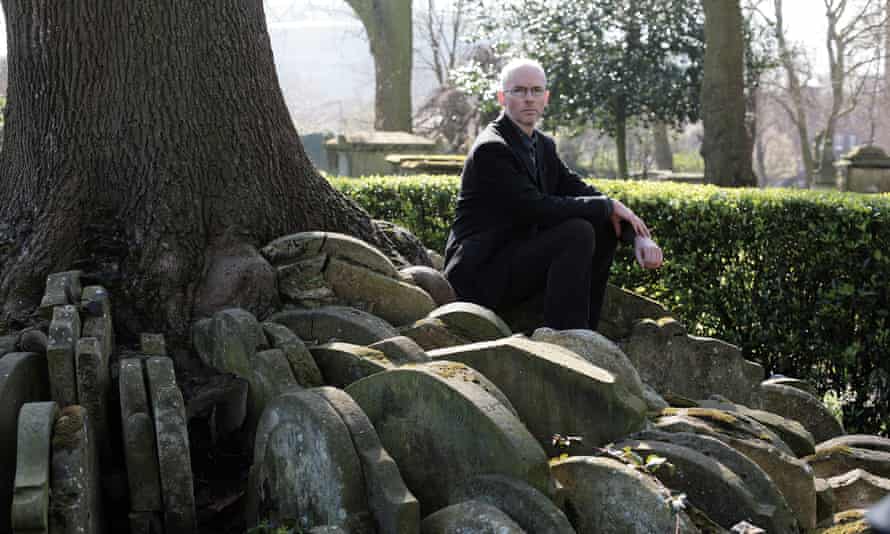 |
| ‘I wanted all the birth and life and death stuff of birds, animals, trees. I thought, that’s as much part of the story as the human life’ … |
A LIFE IN WRITING
Interview
Jon McGregor: ‘I’m allergic to trying to make points in fiction’
The prizewinning novelist and short story writer on capturing daily rural life and the joy of a bad review
Justine JordanFriday 7 April 2017
J
“I’m sure there will be people who feel hoodwinked in some way,” McGregor admits, wryly. Turning 41 this year, he is a slight man with a bone-dry sense of humour (having been runner-up in the BBC national short story award two years running, he describes himself as “Britain’s second-best short story writer”). But though he set out to play with the expectations raised by his opening scenario – “it’s like if you have a gun on the table, it has to be fired by the third act” – the crime element “was never the point of the story for me”. The point, instead, is that after the initial crisis, normal life resumes, in all its messy particularity.
“I wanted this to be a book about the passing of time and routines of life, the dailyness of life,” he says. It follows daily patterns – work, school, pub – while as each year passes, the seasonal rituals are adhered to: from the harvest festival to the Christmas panto and Mischief Night.
What makes the novel so unusual is the combination of its rigid structure – limited to two or three pages for each month – with a restless, freewheeling narrative voice, which circles the characters and the area, settling briefly on an individual or event for a matter of sentences then moving fluidly on. It also gives as much emotional weight to the natural world as to the human one, noticing in one breath the foxes giving birth in the beech wood, “earthed down in the dark and wet with pain”, and in the next the proceedings of the parish council. “I wanted all the birth and life and death stuff of various different birds, animals, trees,” says McGregor. “I thought, that’s as much part of the story as the human life.”
He wrote the book out of sequence, getting down all the scenes about individual families, and then all the lines about blackbirds, foxes, reservoirs and so on, storing the sections in a ring binder. “Then I went back and cut it all up and rearranged it. There was a point when it was purely collage.” This unusual method may explain the vivid freshness of the prose and the book’s understated, cumulative power: “at any one moment I was only worried about each line”. He also became aware as he wrote that the “very rhythmical, fixed structure” he’d imposed on himself meant he “couldn’t do what your instinct as a writer would normally be to do, to dwell on the dramatic focus and skip over the less dramatic times”.
Weaving together different characters, interspersing private thoughts with public dramas, fleeting details with life-changing events, McGregor builds an extraordinary collective symphony of community life. It’s the fruition of a project that began with his Booker-longlisted debut, 2002’s If Nobody Speaks of Remarkable Things, which focuses on the inhabitants of a single street over the course of one day, and continued in the Impac-winning Even the Dogs (2010), where the narrative is shared between a group of homeless addicts. “It’s the idea that you have lots of people and they’re individuals but they overlap,” McGregor explains. In Reservoir 13 he uses the passive voice to evoke a communal identity, which encompasses a shared unconscious where the missing girl haunts the villagers’ dreams, and a curtain-twitching nosiness in which everybody knows everybody else’s business.
“The passive voice was really deliberate because it just feels very English to me,” McGregor says. “It’s a gossipy village, but they would never think of themselves as gossips. ‘Somebody was seen.’ They’re not going to say: ‘I saw so and so.’ Small communities can be very inclusive, but they can also be very claustrophobic.”
McGregor may be a quintessentially English writer, but he was born in Bermuda: “My dad was a curate in Streatham [in south London], and saw a job advert in the Church Times. Off they went. They came back five years later to New Cross, which must have been a shock.”
His parents had one daughter, and were told they couldn’t have any more children, so in Bermuda they adopted a mixed-race baby boy. “About nine months later, my mother was pregnant with me. I guess I was a shock.” Another brother was born once they were back in England, and the family moved to Norwich. “Norfolk is where I grew up, but I’m slightly rootless.” Themes of adoption and exile drive his second novel, So Many Ways to Begin, which was also Booker-longlisted: “the idea of what does family mean, what does it mean to be a parent, biological connection”.
He sums up his early life as “straightforward” – “my parents were just nice, and that was fine” – but it left him “quite interested and slightly defensive about class because my dad was a vicar, so that made us middle class. But the vicarage was on a council estate and I went to the local comprehensive school and we were worse off than my working-class friends.” Nowadays, “I fully accept that I am completely middle class and yet I don’t identify with a lot of other people who are middle class.” His books are not typically middle-class literary fiction – “but I can’t pretend they’re working class, either.” And there’s a whiff of condescension, as he readily agrees, in the way he’s been lauded for writing exquisitely about “ordinary” people and “ordinary” lives. “It’s quite an othering statement. Ordinary people are somehow the ‘other’ people. My take is that nobody is ordinary to themselves. Everyone’s life story is interesting, complicated and nuanced.”
McGregor grew up dreaming, he has joked, about becoming a struggling writer. “I was always very drawn to the idea of living frugally in order to be able to work less and do the things you wanted to do.” At Bradford University, studying media production, he had his first short story published: “an incredibly enabling thing. Up until that point I’d been thinking, am I kidding myself? As soon as I had something published, I thought: this is what I’m going to try and do. I didn’t think it would pay.” His friends were moving down to London, but he made the “practical choice” to stay in the cheap north and, inspired by Magnus Mills’s day job as a bus driver, take work that wouldn’t drain his creative juices. “Didn’t go out much, didn’t spend much, just was really committed to building a life that would function around being able to spend time writing.”
As it turned out, he wasn’t a struggling writer for long. He was working in a restaurant when he landed a publisher for If Nobody Speaks of Remarkable Things. “I hung on to that job for a little while because I knew it sounded good to say I was working as a potwasher. It was cynical, but people like those kinds of stories.” The novel was called in for the Booker prize, and at 26 he found himself on the longlist. Adulatory reviews followed, but they made him uneasy. “I remember thinking, yes, I was quite pleased with the book, but it’s not this good. It shouldn’t be this straightforward. It felt a little bit hollow.”
A useful corrective came in the shape of a corrosive review by Eileen Battersby in the Irish Times, who called the book “a pretentious parade of heavily intense gestures … dominated by its misplaced belief in its own profundity and technique”. “The things she picked up on were the criticisms I’d now have – it’s overwritten, an explosion of similes, sentimentality, overdeterministic plotting. She let rip, but you felt it was coming from a proper critic.” McGregor took it all to heart and incorporated those points into his writing. “I think with the second book I almost went too far the other way. It was very quiet and still. And too long. But when Even the Dogs was published and she wrote a very positive review that felt really earned.” The experience left him with respect for the role of the dedicated critic.

Jon McGregor by the ‘Hardy tree’ in St Pancras graveyard, London, growing from gravestones moved while Thomas Hardy worked there. Photograph: Martin Godwin/The Guardian
After a spell of “post-university drifting about”, McGregor came to rest in Nottingham, following his wife’s move there for a social work diploma (her job as a mental health support worker with homeless people was the starting point for Even the Dogs). The couple have three children, 12, nine and four; they separated in 2014. It was “a difficult few years” during which McGregor stopped writing for a while. “Life was too busy. It’s easy to get out of the rhythm.”
Since 2012, he has been a professor of creative writing at the University of Nottingham, where with the help of students he edits the literary journal the Letters Page, in which all the pieces, whether stories, poetry or essays, are epistolary. “There is something very unintimidating about the idea of writing a letter, so we get a lot of submissions from people who are not writers. Some of them have a really nice unaffected quality.”
It was obsessive teenage letter-writing that helped forge McGregor as a writer; reaching out for like-minded friends, he cultivated a stable of penpals, and every day on the train from Thetford to Norwich while studying for his A levels he would write about the people he saw around him. “This sounds a bit pretentious, but I was doing a lot of experimenting with form in those letters. They weren’t just standard letters; some of them had different characters and voices, some were written in play text form.” The Letters Page was also inspired by the year he gave up email; it was 2013, early on in the writing of Reservoir 13, and he was already panicking about being behind schedule. His automated invitation for people to contact him by post led to “a few nice correspondences”, but the best thing was that people forgot the experiment was only for 12 months. “Years later, people are still not emailing me.”
As well as editing the Letters Page, McGregor is teaching creative writing, something he initially resisted. “Yes, there’s a real danger that it is a pyramid scheme – people come out one end with an MA and a PhD and they stumble into a job and go back in. But encouraging students to think analytically about their writing is really good fun.”
Looking at his own work, McGregor was only too aware that in Reservoir 13 he could have written a “great state-of-the-nation thing about the farming crisis, the land use crisis, the housing crisis”. His research took him to villages where people commute into office jobs in Sheffield or Manchester, while rural workers can only afford to live in the cities: the two groups drive past each other morning and evening – a brilliant image of the messed-up housing market. But he stresses that he’s “allergic to trying to make points in fiction”. With his antipathy towards “big drama” he was also relieved to have sandwiched the book between the foot-and-mouth crisis of 2001 and the Brexit vote. He did, though, find himself last June mentally dividing the characters into leavers and remainers. “I started looking at them while I was editing, thinking OK, so which one of you … and realised that yes, I probably could tell.”

No comments:
Post a Comment